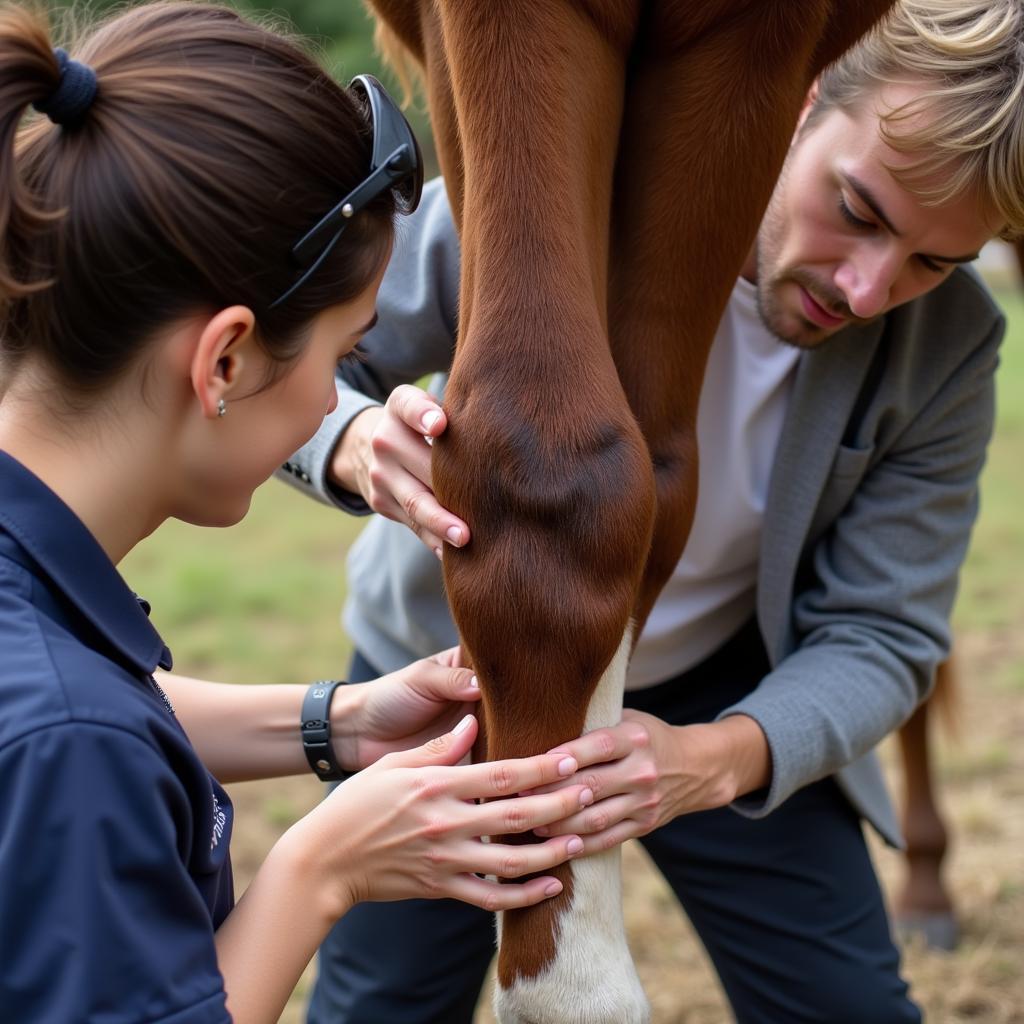Horses And Tetanus are a dangerous combination. Tetanus, also known as lockjaw, is a serious bacterial infection that affects a horse’s nervous system. This potentially fatal disease can be prevented with proper vaccination. Understanding the risks, recognizing the signs, and prioritizing prevention are crucial for every horse owner. This guide will provide you with essential information to protect your equine companion from this devastating disease.
Understanding Tetanus in Horses
Tetanus is caused by the bacterium Clostridium tetani, which is commonly found in soil, manure, and the digestive tracts of animals. These bacteria produce toxins that interfere with nerve signals, leading to muscle stiffness, spasms, and paralysis. Even seemingly minor wounds, like a puncture wound from a rusty nail, can provide an entry point for the bacteria.  Horse showing tetanus symptoms – muscle stiffness and sawhorse stance
Horse showing tetanus symptoms – muscle stiffness and sawhorse stance
Horses are particularly susceptible to tetanus. Unlike humans, horses don’t have a naturally acquired immunity to the disease. This means that any exposure to the bacteria, regardless of how small, can potentially lead to infection. This vulnerability underscores the importance of proactive prevention through vaccination.
The Importance of Tetanus Vaccination for Horses
Vaccination is the most effective way to protect your horse from tetanus. The tetanus toxoid vaccine stimulates the horse’s immune system to produce antibodies against the tetanus toxin, preventing the disease from developing. A primary series of two injections, given 4-6 weeks apart, followed by regular boosters, is typically recommended. spring vaccines for horses You can discuss the best vaccination schedule with your veterinarian, who can tailor it to your horse’s specific needs and risk factors.
Why are yearly boosters so important?
While the initial vaccination series provides a good foundation of protection, the immunity wanes over time. Annual boosters are crucial to maintain adequate antibody levels and ensure ongoing protection. what vaccines do horses need yearly These boosters act as a “reminder” for the immune system, prompting it to continue producing the necessary antibodies to fight off the tetanus toxin.
Recognizing the Signs of Tetanus in Horses
Early diagnosis and treatment are crucial for improving a horse’s chances of survival. Being familiar with the signs of tetanus can help you identify the problem early and seek veterinary care promptly. tetanus in horses signs Common symptoms include:
- Stiffness in the muscles, particularly in the neck and jaw (hence the name “lockjaw”)
- Difficulty swallowing
- Protruding third eyelid
- Sawhorse stance (rigid legs and stiff posture)
- Muscle spasms and seizures
- Sensitivity to light and sound
What should I do if I suspect my horse has tetanus?
If you observe any of these signs, contact your veterinarian immediately. Tetanus is a medical emergency and requires prompt treatment.  Veterinarian examining a horse for potential injuries
Veterinarian examining a horse for potential injuries
Treatment and Management of Tetanus in Horses
Treatment for tetanus typically involves administering tetanus antitoxin to neutralize the toxin, antibiotics to control the infection, supportive care, and wound management. The prognosis for horses with tetanus is variable and depends on the severity of the infection and how quickly treatment is initiated. methocarbamol dose for horses
“Early intervention is key when it comes to tetanus in horses,” says Dr. Emily Carter, DVM, equine specialist. “The sooner treatment begins, the better the chances of recovery.”
Beyond Vaccination: Minimizing Risk
While vaccination is the cornerstone of tetanus prevention, additional measures can further reduce the risk of infection. These include:
- Maintaining clean and sanitary stable conditions
- Regularly cleaning and disinfecting wounds
- Removing sharp objects and debris from pastures
- Providing appropriate wound care for any injuries
“Proper wound care is essential in preventing tetanus,” adds Dr. Carter. “Even small wounds should be cleaned thoroughly and treated appropriately.”
Conclusion: Protecting Your Horse from Tetanus
Horses and tetanus don’t have to be a tragic combination. By prioritizing vaccination and implementing sound management practices, you can effectively safeguard your horse from this devastating disease. Regular veterinary check-ups, including annual boosters, are essential for maintaining your horse’s health and well-being. 6 way shot for horses Don’t wait until it’s too late – take proactive steps today to protect your equine companion from tetanus.
When you need assistance, please contact us at Phone Number: 0772127271, Email: [email protected] or visit our address: QGM2+WX2, Vị Trung, Vị Thuỷ, Hậu Giang, Việt Nam. We have a 24/7 customer service team.